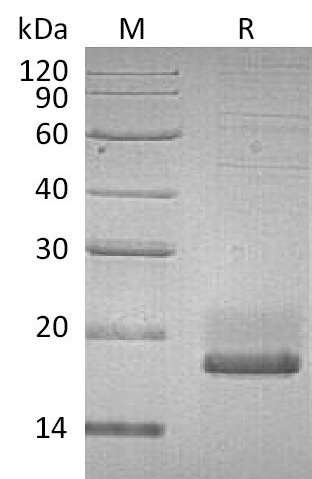- Remove All
 Your shopping cart is currently empty
Your shopping cart is currently empty
SUMO3 Protein, Human, Recombinant (HEK293, His)
Small ubiquitin-like modifier (SUMO), also known as SUMO homologue and SMT3, is a member of the superfamily of ubiquitin-like polypeptides that become covalently attached to various intracellular target proteins as a way to alter their function, location, and/or half-life. Small ubiquitin-like modifiers include SUMO1, SUMO2, SUMO3, and SUMO4. Except for SUMO4, all other SUMOs are ubiquitously expressed, including in the brain. In human, SUMO2 and SUMO3 are two highly homologous proteins, collectively called SUMO2/3. Several studies suggest that SUMO3 are associated with pathogenesis in several neurological diseases, including Alzheimer's disease, Parkinson's disease, and cerebral ischemia/stroke.

SUMO3 Protein, Human, Recombinant (HEK293, His)
| Pack Size | Price | Availability | Quantity |
|---|---|---|---|
| 10 μg | $72 | 7-10 days | |
| 50 μg | $184 | 7-10 days | |
| 500 μg | $1,390 | 7-10 days | |
| 1 mg | $1,980 | 7-10 days |
Product Information
| Biological Activity | Activity has not been tested. It is theoretically active, but we cannot guarantee it. If you require protein activity, we recommend choosing the eukaryotic expression version first. |
| Description | Small ubiquitin-like modifier (SUMO), also known as SUMO homologue and SMT3, is a member of the superfamily of ubiquitin-like polypeptides that become covalently attached to various intracellular target proteins as a way to alter their function, location, and/or half-life. Small ubiquitin-like modifiers include SUMO1, SUMO2, SUMO3, and SUMO4. Except for SUMO4, all other SUMOs are ubiquitously expressed, including in the brain. In human, SUMO2 and SUMO3 are two highly homologous proteins, collectively called SUMO2/3. Several studies suggest that SUMO3 are associated with pathogenesis in several neurological diseases, including Alzheimer's disease, Parkinson's disease, and cerebral ischemia/stroke. |
| Species | Human |
| Expression System | HEK293 Cells |
| Tag | C-6xHis |
| Accession Number | P55854 |
| Synonyms | Ubiquitin-like protein SMT3A,SUMO-3,SUMO-2,Smt3A,SMT3 homolog 1,Small ubiquitin-related modifier 3 |
| Amino Acid | Ser2-Gly92 |
| Construction | Ser2-Gly92 |
| Protein Purity | Greater than 95% as determined by reducing SDS-PAGE. (QC verified)  |
| Molecular Weight | 20 KDa (reducing condition) |
| Endotoxin | < 0.1 ng/µg (1 EU/µg) as determined by LAL test. |
| Formulation | Lyophilized from a solution filtered through a 0.22 μm filter, containing PBS, pH 7.4. |
| Reconstitution | Reconstitute the lyophilized protein in distilled water. The product concentration should not be less than 100 μg/ml. Before opening, centrifuge the tube to collect powder at the bottom. After adding the reconstitution buffer, avoid vortexing or pipetting for mixing. |
| Stability & Storage | Lyophilized powders can be stably stored for over 12 months, while liquid products can be stored for 6-12 months at -80°C. For reconstituted protein solutions, the solution can be stored at -20°C to -80°C for at least 3 months. Please avoid multiple freeze-thaw cycles and store products in aliquots. |
| Shipping | In general, Lyophilized powders are shipping with blue ice. Solutions are shipping with dry ice. |
| Research Background | Small ubiquitin-like modifier (SUMO), also known as SUMO homologue and SMT3, is a member of the superfamily of ubiquitin-like polypeptides that become covalently attached to various intracellular target proteins as a way to alter their function, location, and/or half-life. Small ubiquitin-like modifiers include SUMO1, SUMO2, SUMO3, and SUMO4. Except for SUMO4, all other SUMOs are ubiquitously expressed, including in the brain. In human, SUMO2 and SUMO3 are two highly homologous proteins, collectively called SUMO2/3. Several studies suggest that SUMO3 are associated with pathogenesis in several neurological diseases, including Alzheimer's disease, Parkinson's disease, and cerebral ischemia/stroke. |
Dose Conversion
Calculator
Tech Support

Copyright © 2015-2025 TargetMol Chemicals Inc. All Rights Reserved.


